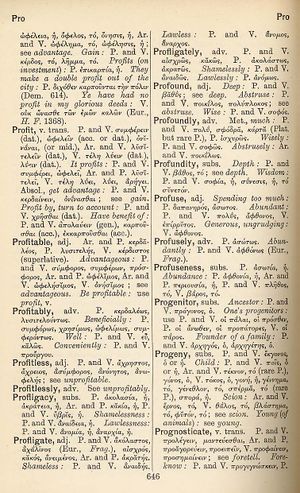progenitor
From LSJ
ἀλώπηξ, αἰετοῦ ἅ τ' ἀναπιτναμένα ῥόμβον ἴσχει → a fox, which, by spreading itself out, wards off the eagle's swoop
English > Greek (Woodhouse)
subs.
Ancestor: P. and V. πρόγονος, ὁ. One's progenitors: use P. and V. οἱ πάλαι, οἱ πρόσθεν, P. οἱ ἄνωθεν, οἱ προπάτορες, V. οἱ πάρος. Founder of a family: P. and V. ἀρχηγός, ὁ, ἀρχηγέτης, ὁ.
Latin > English (Lewis & Short)
prōgĕnĭtor: ōris, m. id.,
I the founder of a family, an ancestor, progenitor (very rare; not in Cic. or Cæs.): si tui veretur te progenitoris, Att. ap. Non. 497, 2: Eurysthenes progenitor majorum suorum, Nep. Ages. 7, 4: deūm, Val. Soran. ap. Aug. Civ. Dei, 7, 11; Ov. M. 11, 319; plur., Isid. Orig. 9, 6, 22; Vulg. 2 Tim. 1, 3.
Latin > French (Gaffiot 2016)
prōgĕnĭtŏr,¹⁶ ōris, m. (progigno), aïeul, ancêtre : Acc. Tr. 76 ; Nep. Ages. 7, 4 ; Ov. M. 11, 319.

